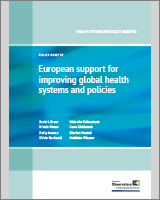NCBI Bookshelf. A service of the National Library of Medicine, National Institutes of Health.
Greer SL, Mauer N, Jarman H, et al. European support for improving global health systems and policies [Internet]. Copenhagen (Denmark): European Observatory on Health Systems and Policies; 2023. (Policy Brief, No. 57.)
The European Union (EU) is one of the world’s largest markets, aid donors, health care innovators and trading powers. As such, many of its policies affect global health. EU policies affect global health directly, as with overseas aid, trade policy or support for the World Health Organization (WHO). They also affect global health indirectly, as with the many internally focused policies which affect health and health policy options in other countries, such as research priorities or medicines regulation. The extensive range of policy areas that touch global health mean that the EU has a wide range of policy tools which inevitably shape global health, and which the EU can use intentionally to shape health governance and outcomes worldwide.
The broad shape of any coherent strategy or approach to global health, in the complex institutional environment of Europe, must align priorities with tools, identifying what the EU wants to achieve in the global health sphere and which policy tools will be best suited to have the desired effects. Alignment requires consideration of the different ways in which countries near the EU already relate to it (e.g. accession candidates) and should include an appreciation of which actors should use the different policy tools, with respect to subsidiarity as well as the advantages of joint action in some areas.
In Part I, we present a method for identifying relevant policy tools in EU global health policy in a select set of areas which have clear and important effects on global health: trade in goods and services; public investment and fiscal instruments; official development assistance (ODA) and humanitarian aid; solidarity, voice and multilateralism (the EU’s role in the broader global health governance system); and research and training. The method involves identifying and delineating a policy area and then focusing on the identification of EU instruments with global effects that can be considered as part of an approach to global health. It could also be useful in policy areas that we do not discuss in depth here, such as climate change policy or agricultural and food safety policy. This Brief is intended to advance, rather than conclude, the debate and should not be read as claiming that any given policy area should be excluded from the EU’s global health thinking.
In Part II we present the range of key policy tools in each area, which reflect the different organization, governance and challenges of the different policy areas – ranging from EU decisions on tariffs and regulation in trade through to the EU approach to various multilateral bodies such as the G7, G20 and United Nations (UN).
The review of EU instruments clearly shows the immense scale of the impact of existing EU policies on global health, and the potential that a coherent approach could have to strengthen global health governance and improve global health policies and outcomes. The EU affects global health through many different policies; the question is how, when and by whom these policies will be used for global health.
- Executive summary - European support for improving global health systems and pol...Executive summary - European support for improving global health systems and policies
Your browsing activity is empty.
Activity recording is turned off.
See more...
